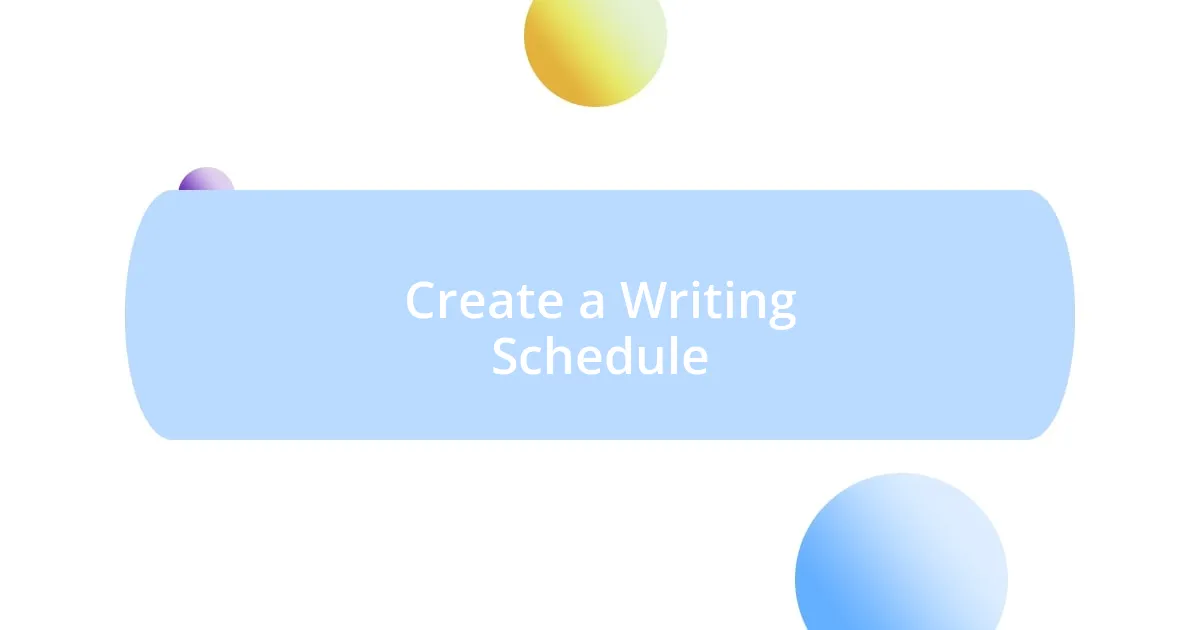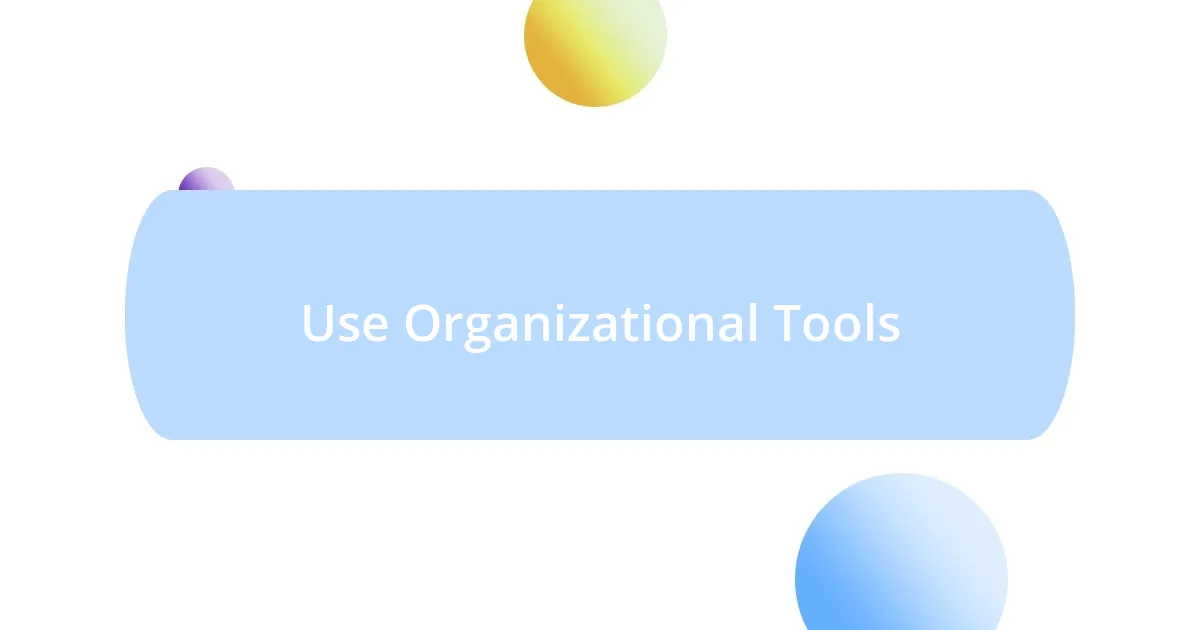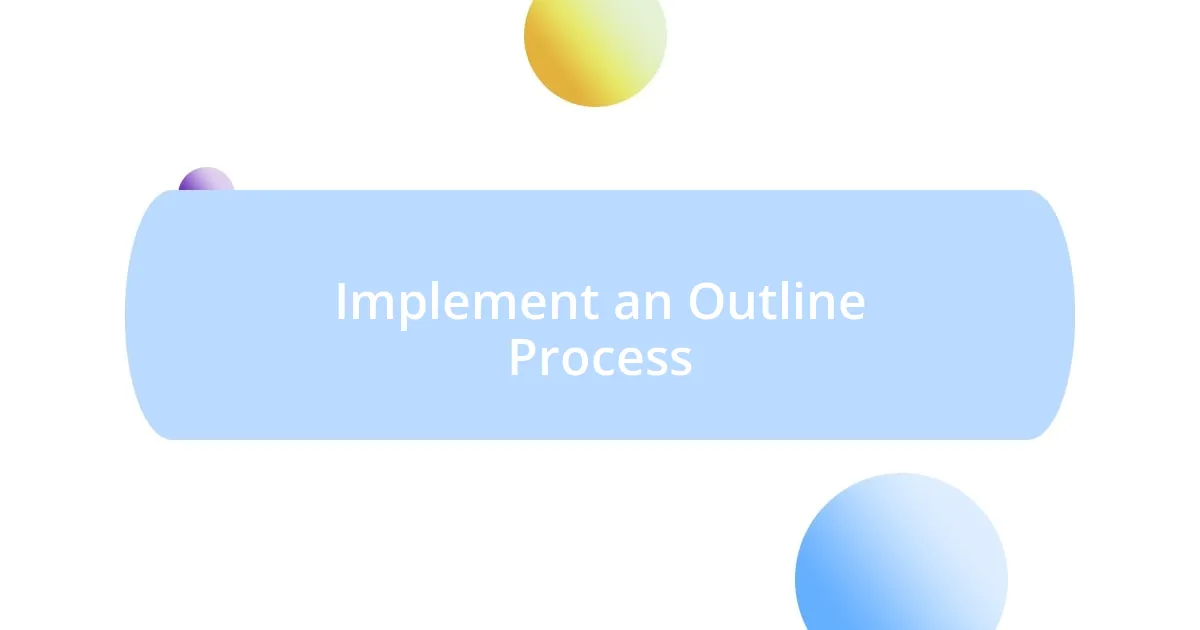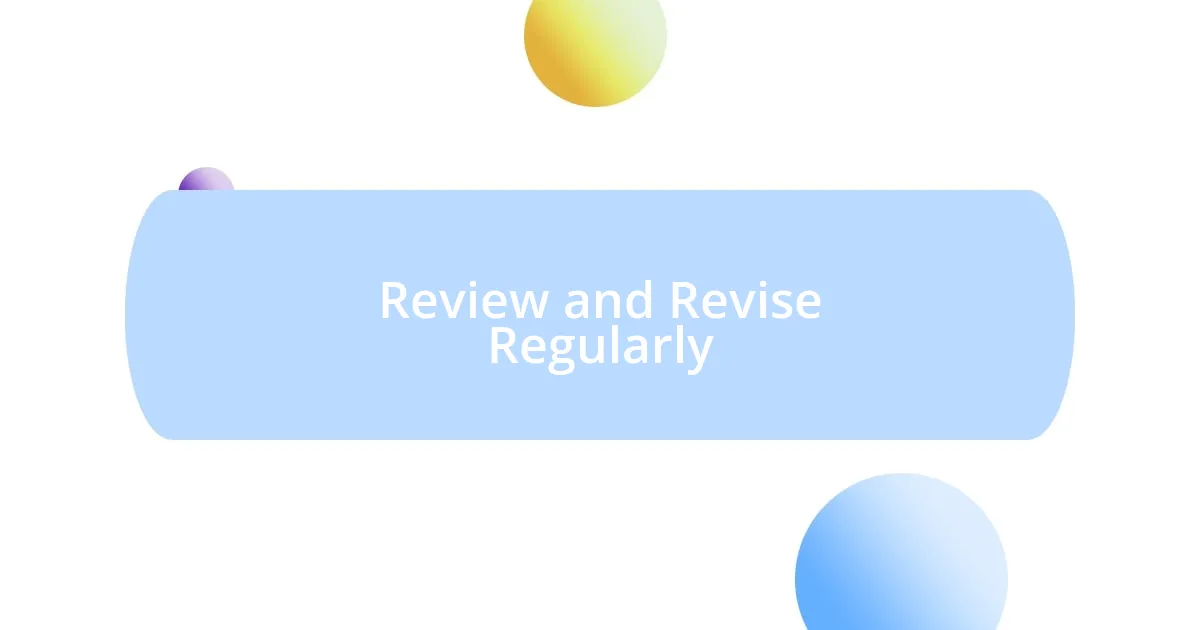Key takeaways:
- Identifying specific writing goals enhances clarity and motivation, guiding the writing process effectively.
- Creating a structured writing schedule promotes consistency and discipline in writing habits.
- Utilizing organizational tools can streamline workflow and enhance productivity, aiding in idea management and collaboration.
- Regularly reviewing and revising writing improves quality, highlighting overlooked areas and enabling clearer expression of ideas.

Identify Your Writing Goals
Identifying your writing goals is like setting the foundation for a solid building. For me, it all starts with defining what I want to achieve with each piece. Is it to entertain, inform, or persuade? When I align my goals with the purpose of my writing, it becomes clearer and more directed.
I remember a time when I sat down to write an article, entirely unsure of my direction. I had a vague idea but lacked focus, resulting in a frustrating first draft that didn’t resonate. But after reflecting on my goal—to genuinely connect with my readers—I found that honing in on this intention transformed the way I wrote. Have you ever felt that frustration, too? It can be overwhelming, but pinpointing what you want to accomplish simplifies the process significantly.
It’s essential to be specific in your goals. Rather than saying, “I want to write more,” try something like, “I want to finish one short story by the end of the month.” Setting measurable targets not only gives you clarity but also motivates you along the way. I’ve found that celebrating small wins, like completing a chapter or a successful blog post, can be the most rewarding part of the journey. What are your key milestones? Are they tangible, or do they float in the ether? Defining them can make a world of difference.

Create a Writing Schedule
Creating a writing schedule has been a game changer for me. I used to write whenever inspiration struck, which often led to sporadic bursts of productivity followed by frustrating dry spells. By setting aside specific blocks of time dedicated to writing, I’ve noticed significant improvements in my consistency and flow. This structure fosters not only a discipline I didn’t know I lacked but also a confidence in knowing when I’ll be able to dive into my projects.
To establish an effective writing schedule, consider these tips:
- Set Fixed Writing Times: Choose times that work best for your personal rhythm—whether you are a morning or nighttime writer.
- Be Realistic: Don’t overcommit; start with a few sessions a week and gradually increase as you find your groove.
- Prioritize Your Sessions: Treat your writing time like a crucial appointment that can’t be missed.
- Include Breaks: Schedule short breaks to recharge, helping to maintain focus without burning out.
- Track Your Progress: Reflect on how well you stuck to your schedule and adjust as necessary.
- Stay Flexible: Life happens, so allow for some wiggle room when unexpected events arise.
When I first implemented my writing schedule, I felt a wave of relief wash over me. I could finally let go of the anxiety of “when will I write?” Instead, I now knew I had designated times to pour my thoughts onto the page. This simple shift not only boosted my productivity but also allowed writing to become a beloved ritual in my daily life. Have you found a rhythm that suits you? Exploring a personal writing schedule might just unlock the consistency you’re seeking.

Use Organizational Tools
Using organizational tools has been a revelation for my writing process. Initially, I shunned technology in favor of traditional pen and paper. But once I started using digital tools like Trello and Evernote, I noticed a significant leap in my productivity. Organizing ideas, resources, and deadlines all in one place keeps my mind clear and focused. Have you ever tried a tool and had it transform your entire workflow? I remember feeling overwhelmed, but once I adopted a simple task management tool, everything just clicked.
Each tool offers different features that can help cater to your unique style. For instance, Google Docs allows for real-time collaboration, while Notion is perfect for building databases of ideas. These tools are like my assistants; they help me track progress while keeping ideas organized. What I enjoy most are the visibility and accessibility they provide. I can reference my notes anytime, anywhere which is incredibly useful when inspiration strikes at unexpected moments. Can you recall a time when you couldn’t find your notes and it frustrated you? That’s where these tools shine!
The beauty of using organizational tools lies in their flexibility. I often mix and match tools to suit various stages of my writing—from brainstorming to final edits. I’ve found that using a combination of mind-mapping software and traditional lists helps to visually gather my thoughts while ensuring all deadlines are met. Adapting to new tools can be daunting at first, but the payoff is worth it. Have you experienced the same growth when embracing new resources? The rewards of staying organized are undeniable.
| Tool | Features |
|---|---|
| Trello | Visual board for task tracking |
| Evernote | Note-taking with tagging and organizational options |
| Google Docs | Real-time collaboration and easy sharing |
| Notion | Customizable workspace for notes and tasks |

Implement an Outline Process
Implementing an outline process has truly transformed how I approach writing projects. By breaking down my ideas into a structured format, I can see the bigger picture clearly. Whenever I sit down to write, I start with a simple outline that highlights the main points I want to cover, which saves me a lot of time and frustration. Have you ever felt lost in your writing? Creating a clear outline has definitely kept me on track and focused.
I recall a time when I was juggling multiple writing assignments. Without an outline, I often found myself drifting from one topic to another, which left me exhausted and overwhelmed. By using outlines, I not only organized my thoughts but also gained a roadmap to follow. This method makes it easier to pinpoint where each idea belongs, almost like piecing together a puzzle. Have you noticed how much more coherent your writing becomes with an outline guiding you?
In my experience, flexibility within the outlining process can enhance creativity. Sometimes, I don’t stick strictly to my original outline; I allow myself the freedom to adapt as I write. This balance between structure and creativity has been key for me. What do you think about mixing a solid outline with spontaneous ideas? It has made my writing both organized and genuinely enjoyable, leading to better final drafts.

Set Up a Distraction-Free Environment
Setting up a distraction-free environment is crucial for my writing process. I’ve learned that eliminating visual clutter can have a profound impact on my focus. When my workspace is tidy and organized, I find that I’m less likely to get sidetracked by the mess around me. Have you ever noticed how a small change, like cleaning your desk, can refresh your mindset? It really works wonders for me.
I also make a point to minimize digital distractions. For instance, I turn off all notifications on my phone and laptop when I’m in the writing zone. The thrill of an incoming message often pulls me away from my flow. One time, I fell into the trap of checking social media during a writing session, and I ended up wasting an hour! Now, my “Do Not Disturb” mode has become a reliable ally. Have you experimented with similar boundaries to create a focused writing atmosphere? It definitely has its benefits.
Finally, I invest some time in creating an inspiring ambiance. Soft lighting, a cozy chair, and even calming background music transform my space into a creative sanctuary. I remember a night when I dimmed the lights and played instrumental music; it sparked a rush of ideas that flowed effortlessly onto the page. What kind of atmosphere inspires creativity for you? Finding what works for me has turned writing into an enjoyable and immersive experience, rather than a chore.

Review and Revise Regularly
Regularly reviewing and revising my writing is one of the most valuable habits I’ve cultivated. I often set aside specific times to go back over what I’ve written, and this practice allows me to spot inconsistencies and refine my ideas. Isn’t it amazing how fresh eyes can reveal overlooked details? For me, it’s like turning on a light in a dim room, illuminating all the parts that need a little more attention.
There was a project I once completed without thorough revision, thinking it was solid. I submitted it, only to realize later that I had missed crucial arguments and had typos scattered throughout. That experience taught me the importance of distance before a final review. Now, I make it a point to step away from my work before revisiting it. This break lets me return with a clearer perspective—like revisiting an old friend and seeing them in a new light. Have you ever been surprised by what you catch during a revision?
In practice, I’ve discovered that breaking my revision into manageable chunks is key. Rather than tackling an entire piece in one go, I focus on smaller sections, allowing myself to dive deep into each part. This method not only keeps me organized but also makes the process less daunting. It’s almost like savoring a delicious meal, where each bite (or paragraph) offers something unique. How do you approach your revisions? Finding a rhythm that works for you can make all the difference in polishing your writing into something truly special.

Maintain a Positive Mindset
Maintaining a positive mindset is essential for me whenever I sit down to write. I’ve found that surrounding myself with affirmations or inspirational quotes can instantly lift my spirits. One time, during a particularly challenging project, I stuck a sticky note on my computer that read, “You are capable of amazing things.” Each time I glanced at it, I felt a surge of confidence. What little reminders do you use to boost your mood while writing?
I also embrace the power of gratitude. Before I start writing, I take a moment to reflect on what I’m thankful for, whether it’s my ability to express myself or the support from friends who encourage my work. This simple practice reminds me that writing is not just a task but a privilege. Have you ever noticed how gratitude can shift your perspective? For me, acknowledging the positives makes even the toughest writing days feel manageable.
Finally, I believe in celebrating small victories. After finishing a difficult section, I like to give myself a little treat or take a break to do something I enjoy. This not only reinforces a sense of progress but also keeps my energy high. I still remember the exhilaration I felt finishing my first draft; I rewarded myself with my favorite coffee. What do you do to celebrate your achievements in writing? Keeping that joy in the process can turn writing into a more fulfilling journey.














